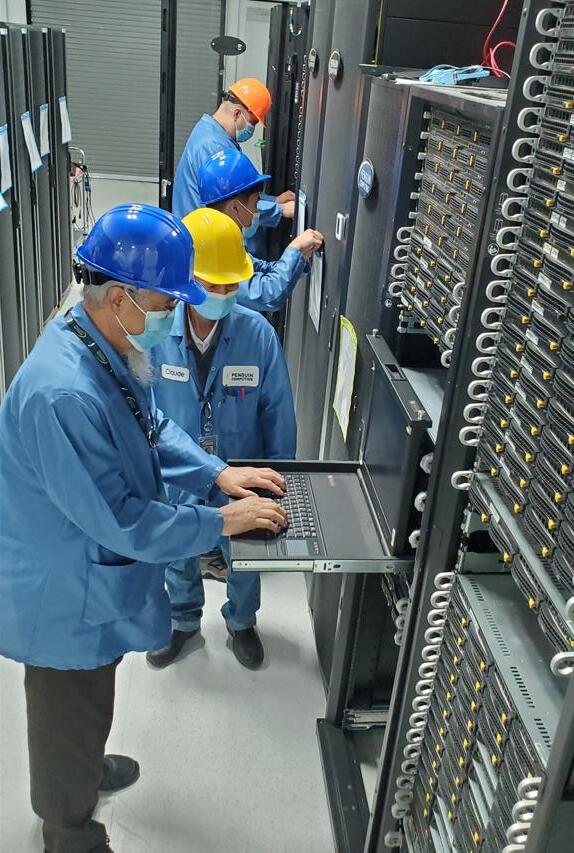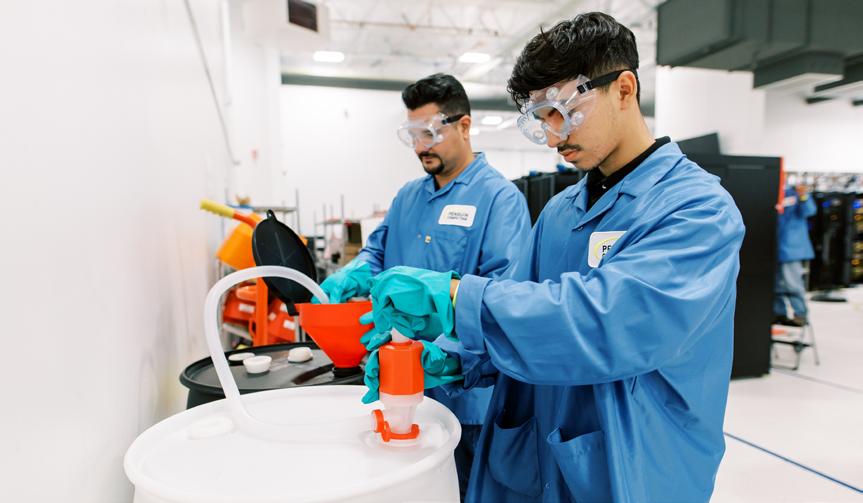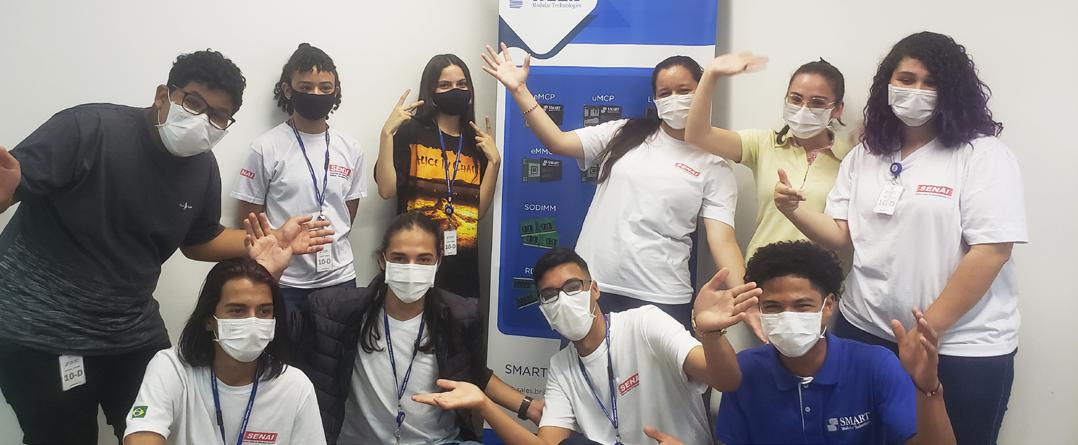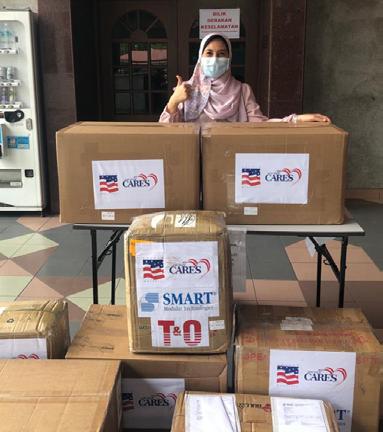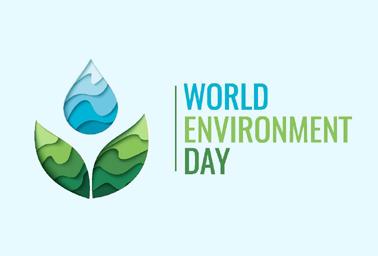OUR ESG GOALS
In 2020, we had a number of achievements related to improved safety in our operations, enhanced protection of our employees, and expanded sourcing of clean energy
In 2021, we established a set of goals that we continue to make progress on, and we expanded our efforts to boost our renewable energy sourcing, advance the leadership of our female and minority employees, and improve our public disclosures In the tables below, we share our 2020 achievements and our future ESG goals
2020 Achievements
All manufacturing sites maintained ISO 9001 Quality certification (or equivalent)
All manufacturing sites maintained ISO 14001 Environmental certification
All manufacturing sites maintained ISO 45001 Health & Safety certification
All manufacturing sites maintained Low Risk in RBA SAQ (annual process)
All manufacturing sites, except Penguin Computing, maintained active RBA VAP (every 2 year process)
All key suppliers agreed to SGH Supplier Code of Conduct or confirmed adherence to a substantial code of their own 100% supplier response to Conflict Minerals information requests
GOVERNANCE & ETHICS
ESG MANAGEMENT
SGH’s Environmental, Social and Governance (ESG) steering committee meets monthly to develop and implement strategies for creating a sustainable world where our people, communities and the environment can thrive. The steering committee is made up of senior executives in Finance, Legal, Human Resources, Operations, and Marketing and Communications, and is led by our Quality department. Our ESG steering committee reviews our policies, evaluates and sets long-term objectives, and approves public disclosures regarding corporate social responsibility The Board of Directors is updated regarding the company’s ESG efforts on a regular basis.
We are committed to business practices that are as environmentally sustainable as they are beneficial to our stakeholders and the community
ETHICS AND COMPLIANCE
Ethical business practices are paramount, and we believe that long-term business relationships are built on trust, honesty, openness and fairness in order to reduce risk and maintain integrity Our commitment to ethics is demonstrated by our Code of Business Conduct and Ethics, our Supplier Code of Conduct and our membership in the RBA, which align with the UN Guiding Principles
These policies apply to SGH employees, contractors and suppliers across the globe, and they are reinforced through consistent communications in town hall meetings, emails and online training which is required upon the start of employment and refreshed every other year for
employees 100% of regular full-time employees have completed their online training
REPORTING CONCERNS
Employees, customers, partners and suppliers are encouraged to report concerns of unethical or illegal behavior through SGH’s whistleblower hotline. The hotline is offered in several languages and accepts anonymous reports online, at smartm.alertline.com, or by making a toll-free call from any of the locations where SGH or one of its subsidiaries has a presence The hotline information is posted in all of our offices and factories around the globe and can also be found on our internal and external websites The SGH Chief Compliance Officer also hosts quarterly meetings with representatives of each site, globally, to proactively discuss the company’s
compliance efforts and to encourage the reporting of any concerns regarding misconduct
As communicated in our Board-approved Whistleblower Policy, reports of misconduct are communicated to the General Counsel, the Chief Financial Officer, the Chairperson of the Audit Committee, and/or the Audit Committee, depending on the nature of the report
Furthermore, SGH has a strict policy prohibiting retaliation against any employee for reporting concerns or participating in investigations regarding misconduct, which is set forth in our Code of Business Conduct and Ethics and our Whistleblower Policy
SGH and all operating companies act in accordance with the highest ethical and
professional standards of business ethics and observe all applicable laws and regulations while conducting business In 2020, we had no monetary losses as a result of legal proceedings associated with anti-competitive behavior
PRIVACY AND DATA SECURITY
As our world becomes more digital, data security and privacy play significant roles in protecting our proprietary and confidential information, as well as that of our customers and partners Our Cybersecurity Risk Management Committee, established in 2021, a subcommittee of our Board of Directors, oversees information technology (IT) use and data security, including enterprise cybersecurity, data collection and protection, and compliance with information security and data protection laws in accordance with our ongoing
implementation of our Information Security Risk Management (ISRM) framework build on National Institute of Standards and Technology (NIST) and International Organization for Standardization (ISO) standards.
During 2020, as global shelter-in-place mandates required many of our employees to work remotely, we took steps to exercise caution in privacy and security Our internal audit team releases monthly newsletters to help employees remain vigilant, maintain good security practices, and ultimately keep our network safe. These newsletters are made available to our employees around the globe, in multiple languages, and cover topics such as social engineering, phishing, confidential information protection and other security hygiene best practices Employees are also trained regularly on best practices for cybersecurity
PRODUCT SAFETY AND COMPLIANCE
We are focused on sustainable innovation, including protecting human health and the environment through the responsible management of chemical substances
RoHS and REACH Compliance
We work diligently with our suppliers to ensure that the components we use are lead-free and compliant with the most current version of the European Union’s (E U ) Restriction of Hazardous Substances (RoHS) directive. To execute the material declaration process, SGH has adopted a comprehensive third-party tool used to compile, manage and validate the substances present in our supply chain
SGH also complies with the E U ’s Registration, Evaluation, Authorization and Restriction of Chemicals (REACH) regulations to manage and mitigate the risks from chemical exposure to our employees, our community and the environment
Our company-wide goal is to minimize negative impact, and to support this we actively encourage our suppliers to find innovative ways to eliminate the use of any substances that may put our environment at risk
Proposition 65 Compliance
Under California regulation Proposition 65, SGH is required to inform individuals in the State of California about possible exposure to chemicals identified to pose the risk of causing cancer or reproductive toxicity A Proposition 65 warning does not necessarily mean a product is in violation of any product-safety standards or requirements
While we do not sell directly to consumers, our goods are incorporated in end products that are sold to consumers As a component manufacturer, we have concluded that most of our products contain at least one substance included in the Proposition 65 List This information is communicated to our customers through product declarations as well as to all employees with signage at all entrances to our facilities
the public and the environment It provides the framework to develop, implement, monitor and improve QEHS objectives, targets and performance standards to mitigate our exposure to risks We conduct internal and external audits annually to maintain our standards of operation and maintain our ISO certification. The QEHS Management System applies to all SGH’s business locations, business units and functions, as well as all aspects of our global business processes
We conduct internal and external audits annually to maintain our standards of operation and maintain our ISO certifications.
QUALITY, ENVIRONMENTAL, HEALTH AND SAFETY MANAGEMENT SYSTEMS
We deliver purposeful solutions that are built to last, and we do so while fulfilling our compliance obligations and satisfying other requirements related to quality, the environment, health and safety (QEHS). SGH has established a QEHS management system, which is aligned to the principles of ISO and defines elements by which SGH conducts its global business and the protection of its employees and stakeholders,
For more than two decades, SGH has been certified in all of our manufacturing facilities to the ISO 9001, ISO 14001, and ISO 45001 standards as a part of our commitment to ensuring Quality, Environmental, Health and Safety, business practices to help minimize the environmental impact of our operations We also partner closely with our suppliers to encourage their adoption of all the ISO principles, and expect our critical suppliers to be ISO 14001 certified or submit a plan to become certified. Please visit our website to learn more about our ISO 9001, ISO 14001, and ISO 45001 certifications.
OUR ENVIRONMENTAL STEWARDSHIP
As a global technology holding company, we are building a world that’s always advancing, and we understand our ability to make a positive impact on our environment and our community We believe it is our responsibility to ensure that we are deploying environmentally sustainable business practices to help minimize the effect of our operations and value chain.
Our environmental sustainability strategy and programs are managed by the Quality team, which sets goals, tracks progress and ensures compliance to legal requirements The team meets regularly to seek out, identify and address negative impacts that can be reduced or eliminated in order to foster a cleaner and healthier environment
ENERGY MANAGEMENT
With approximately 80% of our operational greenhouse gas (GHG) emissions attributed to our electricity procurement, we focus on our energy management as a part of our broader climate strategy We take actions to measure, reduce and report on our climate impact and proactively invest in projects that support conservation and renewable energy
For over a decade, we have implemented numerous energy conservation initiatives at our sites around the world -- from energy-saving appliances to efficient lighting and smart temperature controllers. In the last five years, we have implemented multiple lighting initiatives to reduce our energy consumption, including introducing motion sensors and LED upgrades. Our continued efforts have been recognized by government agencies and business forums alike, winning our site in Penang, Malaysia multiple awards in efficient energy practices.
RENEWABLE ELECTRICITY IN ATIBAIA, BRAZIL
In 2016, our facility in Atibaia, Brazil began sourcing 100% of its electricity from renewable sources and now uses a combination of biomass, solar and wind energy to power the site This change in sourcing has contributed to a 98% decrease in our total emissions since 2017
In an effort to maintain our downward trend of GHG emissions, in 2021, we have committed to achieving a total of 75% renewable energy use at our global operations by 2025
GREENHOUSE GAS EMISSIONS
We recognize that climate change is a critical threat, and we’re committed to raising the bar on our sustainability initiatives to deliver better products, more efficient operations, better working environments and added value for our customers As we continue to grow our businesses -- and with it our operational footprint -- we implement scalable programs that address our energy consumption and procurement We have made strides in reducing our energy use and using renewable sources at our most energyintensive facility in Brazil
Through numerous energy-saving programs implemented between 2010 and 2019, SGH has managed to limit GHG emissions, even with
increasing business volume Over the last few years, we have proudly achieved many of the goals we set to reduce our emissions
Our Emissions
Data
Since 2009, SGH has measured the GHGs we produce during production and manufacturing We focus our GHG reduction reporting efforts on the Scope 1 and Scope 2 emissions from our all our manufacturing sites Our Brazil location has had the biggest opportunity for improvement and has benefited from access to renewable electricity. This has allowed SGH to obtain greater than 60% of electricity from renewable sources
Between 2019 and 2020, our Scope 1 emissions greatly increased due to the opening of our new Embedded Computing Facility in Tempe, Arizona, US and Wireless sites in Bangalore and Kochi, India
*Measured in metric tons of CO2-equivalent
For the most current and detailed information on our climate performance, please see our annual disclosure to CDP
CDP Reporting
We value openness, and in order to maintain transparent communication with the public and with our stakeholders, we submit an annual report to CDP, the global environmental impact
disclosure provider, detailing our greenhouse gas emissions, energy management and water consumption The report also outlines our goals and targets related to climate change and environmental impact We have successfully improved our score year over year, as we refine our methods of tracking and reducing our emissions and become more mature in the management of climate related risks and opportunities
WATER MANAGEMENT
SGH recognizes water as both a critical global resource and an essential aspect of our business operations We diligently monitor our water management and consistently look for opportunities to reduce our water withdrawal and consumption
Water Reuse
For example, in our Atibaia, Brazil facility, we have implemented closed-loop processes that reuse resources as much as possible We use liquid cooling systems, in which the chillers recycle and reuse water, allowing the site to recycle approximately 60% of the water it withdraws, an improvement of nearly 50% since 2018. In the figure below, we demonstrate a steady year-over-year increase in water reuse
improvement at our factory in Brazil We plan to continue this improvement in 2021
We have also expanded our storage capabilities for wastewater treatment, reducing the amount that needs to be transported to a final destination. Outside of our Brazil facility, the majority of our water usage is in office environments, where we minimize water usage by utilizing low-flow bathrooms and waterefficient landscaping.
Water Consumption and Treatment
At all SGH sites, water withdrawals are metered and recorded by local government In our Penang, Malaysia and Newark and Fremont California, US sites, water is discharged to a third-party destination, which is also managed by local agencies In Brazil, the sanitary wastewater is sent to a treatment station
before being discharged into a fresh surface water source
In 2020, our water consumption increased due to added SGH locations in Tempe, Arizona and Kochi, India We strive to reduce our water consumption through increased efficiency and reuse
We also see our water management strategy as an innovative opportunity to reduce our GHG emissions By using hydropower generation from the Kuala Muda River in Malaysia, we have been able to decrease our GHG emissions from what might otherwise be a less green energy source
Water Stress
We are conscious of the water stress levels of the areas from which we withdraw water Using the World Resources Institute’s Water Risk Atlas tool, we’ve determined that none of our factories withdraw from high-stress areas Our site in Atibaia, Brazil is the largest consumer of water, which has a local water stress level of “Low-Medium”, whereas our office in Kochi, India has a water stress level of “High”
Newark, CA, U.S.
CA, U.S.
CA, U.S.
Tempe, AZ, U.S.
Tewksbury, MA, U.S.
Atibaia, Brazil
East Kilbride, Scotland
New Taipei City, Taiwan
Gyeonggi, Korea
Penang, Malaysia
India
India
WASTE MANAGEMENT
As a part of our broader strategy to reduce our resource use, we consistently look for opportunities to consume fewer resources, produce less waste and recycle and reuse as much as possible
Over the last few years, SGH has made strides in creating more environmentally friendly packaging by minimizing and eliminating harmful and wasteful substances, reducing the use of foam and leveraging recyclable materials such as corrugated cardboard
Hazardous Waste
Considering our manufacturing operations, effective waste management is an essential focus to meet our sustainability goals We recognize the unique challenges of complex manufacturing and hazardous waste management and make every effort to reduce the creation of hazardous waste,
when possible For waste that we cannot avoid, we take diligent measures to safely dispose of it in compliance with local laws
We also think outside the box, constantly seeking out innovative solutions to reducing our hazardous waste by partnering with third parties to repurpose materials At our facility in Atibaia, Brazil, silicon
waste is produced from grinding wafers, and to repurpose this waste, we are looking into opportunities to partner with a local developer to make use of it in construction projects
The figures below show the amount of hazardous waste generated and landfilled at each of SGH’s facilities. We are proud that our waste-to-landfill is negligible each year, and we continue to make progress in the amount of waste we are able to recycle. This success is due to innovative and effective solutions, and we look forward to making future improvements in this area
HAZARDOUS WASTE, GENERATED AND LANDFILLED*
Recycling
Our operating philosophy inspires our teams to think creatively to divert waste from landfills. For example, our waste reduction initiatives, such as reducing paper consumption and reuse of packaging material at our Newark, CA, U S facility have won us a STOPWASTE award for business efficiency and waste reduction.
*Measured in metric tons
EMPLOYEE ENGAGEMENT
We put people first, nurturing a culture that supercharges creativity and growth. Our employees are our most valued asset, and we understand the importance of investing in their development and advancement We believe the best workplaces make employees feel inspired, engaged, valued and included It is important to maintain open communication between leadership and employees, and we leverage all-employee meetings to share information, gain employee feedback and hear ideas on a quarterly basis
SGH YOUTH PROGRAM
The SGH Youth Program aims for the development of skills in young people to promote strong values and work ethic In this program, youth from the surrounding community are invited to become “SGH apprentices,” and they meet regularly with SGH leaders to build skills in organization, communication, responsibility and empathy The apprentices are responsible for leading the meetings in which they engage with mentors and present on their projects
We believe in a bottoms-up approach to improving our programs, in which employees are empowered to provide feedback to improve their working experience, and where their voices are met with openness and humility Moving forward, we will plan to solicit employee input through surveys to engage and learn directly from our workforce Using low employee turnover as a proxy for employee engagement, we are proud to report in the past year that our global employee turnover
rate was about 3% in comparison to the industry average which is over 15%
In 2021, we began revamping our corporate strategy to further engage our employees, and have begun standardizing our global performance review process to foster employee growth, recognize achievements, and increase communications We also support development plans through our tuition reimbursement program and other internal training programs
EMPLOYEE AND MANAGEMENT DEVELOPMENT
Continuous growth requires continued investment in people, innovation and new opportunities We are always improving upon our communications between employees and management teams to drive our company goals and enhance the employee experience We aim to develop capable leadership that can meet the challenges of business growth while instilling a supportive and inclusive company culture
At all locations, we provide our employees with performance assessments and evaluations Where applicable, employees also have access to coaching programs, as well as job-specific training.
We also provide our employees with training on workplace culture and enrichment through our learning platform, covering topics such as harassment, creating healthy work environments, inclusion, and global ethics and compliance
DIVERSITY AND INCLUSION
SGH values diversity in all its forms, and we are proud that our employees represent various races, religious beliefs, genders, ages, national origins, sexual orientations, physical and mental abilities, talents and points of view We know that our diverse
teams bring valuable perspectives and backgrounds to our company, helping us consistently raise the bar and drive innovation forward
people-oriented and fair treatment principles in the recruitment, promotion, performance evaluation, compensation, training and retirement of all employees
We are committed to providing employees with an inclusive and non-discriminatory work environment, which is outlined in our employee handbook Through this policy, SGH articulates
SGH employees are provided with opportunities to continue to learn about diversity and inclusion to further raise awareness Our online training
platform provides voluntary training modules such as “Diversity: Inclusion in the Modern Workplace,” “Managing Bias,” and “Equity, Acceptance, and Respect: Global Harassment and Discrimination Prevention ”
Diversity by the Numbers
SGH is committed to creating a working environment with equal opportunity employment so that workers are treated with fairness and respect
Celebrating a Diverse Workforce
We continuously strive to foster a culture of equality, diversity and inclusion by recognizing and celebrating our differences. With a teamfirst mindset, we lift each other up and always seek different perspectives. That’s what enables us to grow, think creatively, and deliver purposeful solutions
This past year, to raise awareness of and to commemorate the emancipation of the last African-American slaves in the United States in 1865, we recognized Juneteenth as a paid holiday for all employees and will continue to celebrate this holiday each year
We also recognize Pride Month and reflect upon and reinforce our support of the LGBTQ+ community, and our commitment to infusing diversity and inclusion throughout our entire
business operations We are dedicated to increasing the visibility of important events that support our diverse workforce and encourage everyone to learn more about why these celebrations mean so much to so many
We lead with openness and aim to foster inclusivity in every aspect of our business At our manufacturing facility in Brazil, we ensure new mothers are supported and provided with the necessary resources to care for their children
The “Mother’s First Steps” and “Welcome Baby” programs aim to promote health, provide guidance on prenatal care and ensure continued education and support through the baby’s first year of life.
We also respect the religious holidays of our diverse employees, and celebrate a variety of cultural events, including Hari Raya, Christmas, Chinese New Year and Deepavali
SGH is committed to creating a working environment with equal opportunity employment so that workers are treated with fairness and respect In the coming years, we look forward to expanding on our strategy to nurture a diverse and inclusive environment by focusing on initiatives such as employee resource groups and recruiting more diverse leadership
WELLNESS, HEALTH AND SAFETY
Employee Wellness in the United States
It’s our responsibility to provide and maintain a safe work environment, as well as to promote overall wellness among employees We prioritize employee wellbeing throughout our operations as well as through physical fitness programs by providing employees with gym membership reimbursement We also support mental health and wellness through our Employee Assistance
Program, which offers free and confidential counseling and support for our employees and members of their households
Additionally, we consider our employee benefits program to be one of our most important investments We recognize the value our employees bring to our company and are committed to providing them with comprehensive benefits programs as part of their total compensation Our primary coverage pertains to medical, dental, vision, life insurance, various forms of accident or disability coverage, and 401k retirement savings plan with immediate vesting of the company match We also provide proactive support on an outreach basis for condition care specific to chronic illnesses.
1 Effective OSH procedures and policies
2 Leadership and commitment to enhance and improve OSH
3 Workers’ participation and awareness OSH programs
Health and Safety
Everyone contributes to maintaining a safe and healthy work environment
We believe prevention is the best mitigation measure and implement precautionary practices in all manufacturing and working protocols
We promote a safe working environment through ensuring compliance to all related Occupational Safety and Health (OSH) Legislation, through the ISO 45001 standard, and to effective OSH procedures and policy implementation.
We conduct health and safety programs such as “Crime Prevention”, “Fire Prevention”, and “CPR Awareness” to promote a healthier, safer workplace
4 Compliance to legislation
Our Health and Safety strategy is comprised of eight key elements
5 Involvement in risk assessment programs
6 Efficient measures for risk control
7 Competent and trained employees in the workplace
8 Continuous monitoring, reviews and audits
Minimizing employee exposure to potential safety hazards is our top priority Risk assessments and periodic safety inspections performed by the Environmental Health and Safety team have been used to identify areas for improvement in safety and prevention. Through continuous effort from this team, safety related incidents are reduced and kept at low levels
MANAGING EMPLOYEE HEALTH AND SAFETY DURING COVID-19
In 2020, as the global pandemic impacted every person, we made it a priority to ensure that our employees and their families were safe and healthy. In our U.S. offices in Newark, Fremont and Tempe, we provided free weekly COVID-19 testing to all employees, as well as diligently maintained contact tracing to track and prevent spread In Penang, automated temperature and facial recognition systems were implemented to ensure that all on-site employees are healthy and protected
We quickly pivoted employees to working from home where possible and provided them
with paid time off under the Families First Coronavirus Response Act (FFCRA) to ensure that they were able to take care of themselves and their loved ones
For our essential employees who worked on-site at our facilities, we took additional measures to ensure their ongoing health and safety We distributed and trained users on the correct use of personal protective equipment (PPE) and maintained social distancing, sanitization, and employee awareness and communication We will continue to take health precautions to ensure that our employees are protected and healthy
We also encouraged our employees to become vaccinated, and as of September 2021, 99% of our employees in Malaysia are fully vaccinated
Through continuous effort from the Environmental, Health and Safety team, safety related incidents are reduced and kept at low levels
SUPPLY CHAIN
SUPPLY CHAIN STRATEGY
SGH strives to maintain sustainable supply chain practices to ensure we are upholding the highest environmental and social standards throughout our value chain We want to be trusted supply chain partners by following all applicable laws and hold ourselves accountable against high ethical standards
We joined the Responsible Business Alliance (RBA) nearly a decade ago and have been committed to upholding their Code of Conduct ever since We also require that our suppliers adopt the RBA Code and follow the principles and practices outlined therein
Our Supplier Code of Conduct details expectations for suppliers to engage in ethical business practices and remain in compliance with applicable laws and regulations We require all of our suppliers to sign the SGH Code of Conduct prior to conducting business
CONFLICT MINERALS
Responsible sourcing is integral to ensuring our products are safe and ethically created. Our Conflict Minerals program is created to monitor the sourcing of tin, tantalum, tungsten and gold from the Democratic Republic of Congo (DRC) and adjoining countries, which are at risk of being mined and sold under the control of armed groups to finance conflict. We follow guidance from RBA’s Responsible Mining Initiative (RMI) to ensure we are up-todate with industry best practices to address the responsible sourcing of minerals in our supply chain
The percentage of global employees covered by a collective bargaining agreement was approximately 30% in 2020
In line with the RMI, and to mitigate sourcing risks, we require all of our suppliers to complete the Conflict Minerals Reporting Template (CMRT) annually. We also provide information about mica and cobalt upon customer request
HUMAN RIGHTS
SGH upholds human rights in our business practices and understands our responsibility to help people prosper globally through our products, our services, and by ensuring we provide a workplace that promotes meaningful work and growth We follow the RBA Code of Conduct and do not allow any forms of forced labor, child labor, or bonded labor In order to ensure human trafficking is not taking place in our supply chain, we work closely in partnership with our suppliers and comply with the UK Modern Slavery Act 2015
Additionally, we make sure that non-exempt employees do not work over 40 hours without compensation, and we do not employ underage workers We require all suppliers to sign our Supplier Code of Conduct annually to mitigate human rights violations We also support the right to freedom of association The percentage of global employees covered by a collective bargaining agreement was approximately 30% in 2020
COMMUNITY ENGAGEMENT
Around the world, we engage locally to make a positive impact in our surrounding communities by encouraging employees to volunteer and participate in charitable giving opportunities that matter to them. At our corporate headquarters in Newark, CA, we celebrate charities such as the Leukemia Lymphoma Society, Make A Wish Foundation and Wounded Warrior Project with an annual walk around the campus to raise funding
Support for Our Communities During COVID-19
Our employees around the world stepped up to support communities when the COVID-19 pandemic hit:
In the U S , we donated N95 masks, surgical masks and gloves to our local hospitals, fire stations and veteran centers
In Brazil, we donated medical equipment to help prevent the spread of COVID-19, donating 3,000 masks and 262 packages of surgical aprons
In Malaysia, we contributed critical medical equipment, including sanitizers, test kits and PPE to the intensive care units of local hospitals
CHARITABLE GIVING
Our efforts to enrich the quality of people’s lives in our local communities take several forms, including matching employee donations and direct corporate giving Our employee donation matching program allows employees to select nonprofits for a company match of up to $2,500 per employee in a calendar year
Employees are also able to donate their vacation time, which gets converted to cash donations to charities of their choice
In 2020, our leadership in the United States opted to donate their company holiday gifts to the Alameda County Food Bank and Second Harvest Food Bank for a total of $13,500
MAKING AN IMPACT IN BRAZIL
We are proud to share the impact that our team in Brazil continues to make in our Latin American communities In 2020, our employees donated nearly 6,000 food baskets to vulnerable families in the cities of Atibaia and Bragança Paulista
In support of education for young people, we donated over 60 professional courses and R$4,849 to support programs at a disabled institute, Apae Atibaia e Bragança In support of sports and culture in the community, our team donated R$400,000
EARTH DAY IN BRAZIL
Our responsibility to the environment, the well-being of our employees, and the health of the communities is essential To celebrate World Environment Day 2020, we hosted an online event for environmental and ecological lectures to take place during the week
In 2021, the SGH team in Brazil spearheaded a month-long campaign to raise awareness about the impact of food waste on the environment During this campaign, we also launched a contest to showcase how to reduce food waste by creating recipes with items that are often discarded, such as peels, roots and seeds
SEMICONDUCTOR INDUSTRY
Total production
Percentage of production from owned facilities
TS-SC-000.A SGH sold approximately 70M units This includes products across all business lines
TS-SC-000.B >98% Topic
Greenhouse Gas Emissions (1) Gross global Scope 1 emissions and (2) amount of total emissions from perfluorinated compounds
Discussion of short/long-term strategy/ plan to manage Scope 1 emissions, emission reductions targets, and an analysis of performance against those targets
Energy Management in Manufacturing (1) Total energy consumed (2) Percentage grid electricity (3) Percentage renewable
Water Management (1) Total water withdrawn (2) Total water consumed, percentage of each in regions with High or Extremely High Baseline Water Stress
TS-SC-000.A (1) 1669 metric tons CO2e (2) Not relevant
For additional information see Greenhouse Gas Emissions section
TC-SC-110a.2 See Greenhouse Gas Emissions section
Waste Management (1) Amount of hazardous waste from manufacturing, percentage recycled
TC-SC-130a.1 (1) 43,359,142 kwH (2) 100% (3) >60%
TC-SC-140a.1 None of our five factory locations operate in regions with High or Extremely High Baseline Water Stress. We have three office locations that operate in High or Extremely High Baseline Water Stress, but water consumption in offices is low.
For additional information see Water Consumption and Treatment section
TC-SC-150a.1 (1) 38 metric tons generated (2) >50% recycled
For additional information see Hazardous Waste section
Employee Health & Safety
Description of efforts to assess, monitor, and reduce exposure of employees to human health hazards
TC-SC-320a.1 See Wellness, Health and Safety section
Recruiting & Managing a Global, Diverse & Skilled Workforce
Total amount of monetary losses as a result of legal proceedings associated with employee health and safety violations
Percentage of employees that are (1) foreign nationals and (2) located offshore
TC-SC-320a.2 None
TC-SC-330a.1 (1) Less than 1% (2) Less than 1%
Product Lifecycle Management
Percentage of products by revenue that contain IEC 62474 declarable substances
Processor energy efficiency at a system-level for: (1) servers, (2) desktops, and (3) laptops
Materials Sourcing Description of the management of risks associated with the use of critical materials
Intellectual Property Protection & Competitive Behavior
Total amount of monetary losses as a result of legal proceedings associated with anticompetitive behavior regulations
TC-SC-410a.1 Less than 5%
TC-SC-410a.2 Not relevant
TC-SC-440a.1 See Conflict Minerals section
TC-SC-520a.1 In 2020, we had no monetary losses as a result of legal proceedings associated with anti-competitive behavior regulations
HARDWARE INDUSTRY
Activity Metric
Number of units produced by product category
Area of manufacturing facilities (square feet)
Percentage of production from owned facilities (%)
Product and Data Security
Description of approach to identifying and addressing data security risks in products
Diversity & Inclusion Percentage of gender and racial/ethnic group representation for (1) management, (2) technical staff, and (3) all other employees
Product Lifecycle Management Percentage of products by revenue that contain IEC 62474 declarable substances
Percentage of eligible products, by revenue, meeting the requirements for EPEAT registration or equivalent
Percentage of eligible products, by revenue, meeting ENERGY STAR® criteria
Weight of end-of-life products and e-waste recovered, percentage recycled
TC-HW-000.A SGH sold approximately 70M units This includes products across all business lines
TC-HW-000.B 406,000
TC-HW-000.C >98%
TC-HW-230a.1 See Privacy and Data Security section
TC-HW-330a.1 See Diversity and Inclusion section
TC-HW-410a.1 Less than 5%
TC-HW-410a.2 Not relevant
TC-HW-410a.3 Not relevant
TC-HW-410a.4 100% of e-waste is recycled
Topic Accounting Metric
Supply Chain Management
Percentage of Tier 1 supplier facilities audited in the RBA Validated Audit Process (VAP) or equivalent, by (a) all facilities and (b) high-risk facilities
Tier 1 suppliers’ (1) non-conformance rate with the RBA Validated Audit Process (VAP) or equivalent, and (2) associated corrective action rate for (a) priority non-conformances and (b) other non-conformances
Materials Sourcing Description of the management of risks associated with the use of critical materials
TC-HW-430a.1 While we do not presently audit our suppliers in compliance with VAP guidelines, 80% of SGH’s annual global supply chain spend is with RBA members whose facilities, in compliance with RBA rules, must be audited by the organization in compliance with VAP procedures
TC-HW-430a.2 While we do not presently audit our suppliers in compliance with VAP guidelines, 80% of SGH’s annual global supply chain spend is with RBA members whose facilities, in compliance with RBA rules, must be audited by the organization in compliance with VAP procedures
TC-HW-440a.1 See Conflict Minerals section
Standard Topic Disclosure
General Disclosures
GRI 102: General Disclosures 2016
02-1 Name of the organization SMART Global Holdings Corp
102-2 Activities, brands, products, and services https://www.sghcorp.com
102-3 Location of headquarters https://www.sghcorp.com/about
102-4 Location of operations 2018 SGH 2020 ESG Report – Our Global Footprint
102-5 Ownership and legal form
https://ir.sghcorp.com/governance/governance-documents/default.aspx
102-6 Markets served https://www.sghcorp.com
102-7 Scale of the organization 2018 SGH 2020 ESG Report – Our Profile
102-8 Information on employees and other workers SGH 2020 ESG Report – People
102-9 Supply Chain SGH 2020 ESG Report – Supply Chain
102-10 Significant changes to the organization and its supply chain https://www.sghcorp.com
102-11: Precautionary principle or approach SGH 2020 ESG Report – Environment
SGH 2020 ESG Report – Governance and Ethics SGH 2020 ESG Report – Supply Chain
102-12 External initiatives https://www.sghcorp.com
102-14 Statement from senior decision maker SGH 2020 ESG Report – A Message from Our CEO
General Disclosures (continued)
GRI 102: General Disclosures 2016 (continued)
102-15 Key impacts, risks, and opportunities
SGH 2020 ESG Report
Code of Business Conduct and Ethics
102-16 Values, principles, standards, and norms of behavior
SGH 2020 ESG Report – About SGH
Code of Business Conduct and Ethics
https://ir.sghcorp.com/
102-17 Mechanisms for advice and concerns about ethics Code of Business Conduct and Ethics
102-18 Governance structure
102-19 Delegating authority
102-20 Executive level responsibility for economic, environmental, and social topics
102-21 Consulting stakeholders on economic, environmental, and social topics
102-22 Composition of the highest governance body and its committees
102-23 Chair of the highest governance body
102-24 Nominating and selecting the highest governance body
102-25 Conflicts of interest
https://ir.sghcorp.com/
https://ir.sghcorp.com/governance/governance-documents/default.aspx
https://ir.sghcorp.com/governance/governance-documents/default.aspx
https://www.sghcorp.com/
https://ir.sghcorp.com/
https://ir.sghcorp.com/governance/governance-documents/default.aspx
https://ir.sghcorp.com/governance/governance-documents/default.aspx
https://ir.sghcorp.com/governance/governance-documents/default.aspx
https://ir.sghcorp.com/
Code of Business Conduct and Ethics
General Disclosures (continued)
GRI 102: General Disclosures 2016 (continued)
102-26 Role of highest governance body in setting purpose, values, and strategy
102-27 Collective knowledge of highest governance body
102-28 Evaluating the highest governance body’s performance
102-29 Identifying and managing economic, environmental, and social impacts
102-30 Effectiveness of risk management processes
https://ir.smartm.com/governance/governance-documents/default.aspx
https://ir.smartm.com/governance/governance-documents/default.aspx
https://ir.sghcorp.com/
https://ir.sghcorp.com/governance/governance-documents/default.aspx
https://ir.sghcorp.com/
SGH 2020 ESG Report
As member of the Responsible Business Alliance (RBA), SMART has fully adopted the RBA Code of Conduct for our own operations, and we expect our suppliers to abide by the Code and to expect the same of their suppliers
102-31 Review of economic, environmental, and social topics
102-32 Highest governance body’s role in sustainability reporting
As part of this process and through the years we have implemented robust management systems—embedded in our operations—to identify, manage and mitigate risks in these areas (environmental, social and governance) In addition, our own facilities are subject to audits through RBA’s validated audit process This audit process is one of the mechanisms we use to assess the effectiveness of our risk management processes for social, environmental and governance issues During FY18, our facilities underwent RBA audits There were no priority findings. SMART is also certified for ISO9001, ISO14001 & ISO45001.
https://ir.sghcorp.com/
https://ir.sghcorp.com/
SGH 2020 ESG Report – Governance and Ethics
102-33 Communicating critical concerns SMART Silent whistle program
102-34 Nature and total number of critical concerns SGH Privacy Policy
Standard
General Disclosures (continued)
Topic Disclosure
GRI 102: General Disclosures 2016 (continued)
102-35 Remuneration policies
102-36 Process for determining remuneration
102-37 Stakeholders’ involvement in remuneration
102-38 Annual total compensation ratio
102-39 Percentage increase in annual total compensation ratio
102-40 List of stakeholder groups
102-41 Collective bargaining agreements
102-42 Identifying and selecting stakeholders
102-43 Approach to stakeholder engagement
https://ir.sghcorp.com/
https://ir.sghcorp.com/
https://ir.sghcorp.com/
https://ir.sghcorp.com/
https://ir.sghcorp.com/
https://ir.sghcorp.com/
https://ir.sghcorp.com/
https://ir.sghcorp.com/
https://ir.sghcorp.com/
102-44 Key topics and concerns raised https://ir.sghcorp.com/
102-45 Entities included in the consolidated financial statements
https://ir.sghcorp.com/financials/sec-filings/default.aspx
102-46 Defining report content and topic boundaries https://ir.sghcorp.com/
102-47 List of material topics
102-48 Restatements of information
SASB Index
GRI Index Annual Report
No major changes
General Disclosures (continued)
GRI 102: General Disclosures 2016 (continued)
102-49 Changes in reporting No major changes
102-50 Reporting period
January 1, 2020- December 31, 2020, unless otherwise noted
102-51 Date of most recent report October 2021
102-52 Reporting cycle
102-53 Contact point for questions regarding the report sustainability@SGHCorp com
102-54 Claims of reporting in accordance with the GRI Standards GRI Content Index
102-55 GRI content index
102-56 External assurance
Material Topics
Data Privacy and Security
GRI 103: Management Approach 2016
Content Index
https://ir.sghcorp.com/
GRI 418: Customer Privacy 2016
103-1 Explanation of the material topics and its boundaries https://ir.sghcorp.com/
103-2 The management approach and its components https://ir.sghcorp.com/
103-3 Evaluation of the management approach https://ir.sghcorp.com/
418-1 Substantiated complaints concerning breaches of customer privacy and losses of customer data SGH Privacy Policy
SMART takes customer data and privacy very seriously and has strict standards and policies and robust management systems in place
Material Topics (continued)
Role of IT in Society
GRI 103: Management Approach 2016
103-1 Explanation of the material topics and its boundaries SGH 2020 ESG Report
103-2 The management approach and its components SGH 2020 ESG Report
103-3 Evaluation of the management approach SGH 2020 ESG Report
Diversity and Inclusion
GRI 103: Management Approach 2016
103-1 Explanation of the material topics and its boundaries SGH 2020 ESG Report – Diversity and Inclusion
103-2 The management approach and its components SGH 2020 ESG Report
103-3 Evaluation of the management approach SGH 2020 ESG Report
GRI 405: Diversity and Equal Opportunity 2016
GRI 406: Non-discrimination 2016
405-1 Diversity of governance bodies and employees SGH 2020 ESG Report – Diversity and Inclusion
405-2 Ratio of basic salary and remuneration of women to men SGH Privacy Policy
406-1 Incidents of discrimination and corrective actions taken SGH Privacy Policy
Material Topics (continued)
GRI 103: Management Approach 2016
103-1 Explanation of the material topics and its boundaries
SGH 2020 ESG Report http://www.sghcorp.com
103-2 The management approach and its components SGH 2020 ESG Report https://www.sghcorp.com/people/
103-3 Evaluation of the management approach SGH 2020 ESG Report
http://www.sghcorp.com
Energy and Emissions
GRI 103: Management Approach 2016
103-1 Explanation of the material topics and its boundaries
SGH 2020 ESG Report https://www.sghcorp.com/environment/
103-2 The management approach and its components SGH 2020 ESG Report http://www.sghcorp.com
103-3 Evaluation of the management approach SGH 2020 ESG Report
GRI 302: Energy 2016
302-1 Energy consumption within the organization CDP Climate Change report
302-2 Energy consumption outside of the organization No information available
302-3 Energy intensity
302-4 Reduction of energy consumption
302-5 Reductions in energy requirements of products and services
CDP Climate Change report
CDP Climate Change report
SGH 2020 ESG Report – Environment
SGH 2020 ESG Report – Diversity and Inclusion
Standard
Material Topics (continued)
GRI 305: Emissions 2016
305-1 Direct (Scope 1) GHG emissions
305-2 Energy indirect (Scope 2) GHG emissions
Product Stewardship
GRI 103: Management Approach 2016
305-3 Other indirect (Scope 3) GHG emissions
CDP Climate Change report
SGH 2020 ESG Report – Environment
CDP Climate Change report
SGH 2020 ESG Report – Environment
CDP Climate Change report
SGH 2020 ESG Report – Environment
305-4 GHG emissions intensity
305-5 Reduction of GHG emissions
305-7 Nitrogen oxides (NOX), sulfur oxides (SOX), and other significant air emissions
CDP Climate Change report
CDP Climate Change report
SGH 2020 ESG Report – Environment
This information is not currently available
103-1 Explanation of the material topics and its boundaries
ISO14001 Manual/ Policy - which comprises the entire product design, manufacturing and after sales
103-2 The management approach and its components QEHS Policy
Code of Business Conduct and Ethics
ISO14001 Manual/Policy
Conflict Minerals Policy
103-3 Evaluation of the management approach
SGH 2020 ESG Report
Site Objectives and targets
Material Topics (continued)
GRI 301: Materials 2016
301-1 Materials used by weight or volume
301-2 Recycled input materials used
GRI 408: Child Labor 2016
GRI 409: Forced or Compulsory Labor 2016
GRI 410: Security Practices 2016
GRI 411: Right of Indigenous Peoples
GRI 412: Human Rights Assessment 2016
301-3 Reclaimed products and their packaging materials
408-1 Operations and suppliers at significant risk for incidents of child labor
409-1 Operations and suppliers at significant risk for incidents of forced or compulsory labor
410-1 Security personnel trained in human rights policies or procedures
411-1 Incidents of violations involving rights of indigenous peoples
412-1 Operations that have been subject to human rights reviews or impact assessments
412-2 Employee training on human rights policies or procedures
412-3 Significant investment agreements and contracts that include human rights clauses or that underwent human
SMART Privacy Policy
SGH 2020 ESG Report
Site Objectives and targets
SGH 2020 ESG Report
Site Objectives and targets
RBA Policy (Labor)
RBA Policy (Labor)
SMART Security Procedure / CTPAT (Certified)
RBA Policy (Labor)
Code of Business Conduct and Ethics
RBA Policy (Labor)
Code of Business Conduct and Ethics
RBA Policy (Labor)
Code of Business Conduct and Ethics
RBA Policy (Labor)
Code of Business Conduct and Ethics
GRI 200: Economic Topics
GRI 201: Economic Performance 2016
201-1 Direct economic value generated and distributed https://ir.sghcorp.com/
201-2 Financial implications and other risks and opportunities due to climate change https://ir.sghcorp.com/
201-3 Defined benefit plan obligations and other retirement plans https://ir.sghcorp.com/
201-4 Financial assistance received from government https://ir.sghcorp.com/
GRI 202: Market Presence 2016
202-1 Ratios of standard entry level wage by gender compared to local minimum wage
202-2 Proportion of senior management hired from the local community
GRI 203: Indirect Economic Impacts 2016
GRI 204: Procurement Practices 2016
This information is not currently available
This information is not currently available
203-1 Infrastructure investments and services supported SGH 2020 ESG Report
203-2 Significant indirect economic impacts SGH 2020 ESG Report
204-1 Proportion of spending on local suppliers
This information is not currently available
GRI 200: Economic Topics (continued)
GRI 205: Anti-Corruption 2016
GRI 206: Anti- Competitive Behavior
GRI 300: Environmental Topics
205-1 Operations assessed for risks related to corruption
205-2 Communication and training about anticorruption policies and procedures
Code of Business Conduct and Ethics https://ir.sghcorp.com/
Online training on anti-corruption policies and procedures
205-3 Confirmed incidents of corruption and actions taken None
206-1 Legal actions for anti- competitive behavior, anti-trust, and monopoly practices
No legal actions related to these topics occurred in the reporting year
GRI 301: Materials 2016 See Material Topics section above This information is not currently available
GRI 302: Energy 2016 See Material Topics section above This information is not currently available
GRI 303: Water and Effluents 2018 303-1 Water withdrawal by source
303-2 Management of water dischargerelated impacts
2020 ESG Report - Environment
2020 ESG Report - Environment
303-3 Water withdrawal This information is not currently available
303-4 Water discharge This information is not currently available
303-5 Water consumption
2020 ESG Report - Environment
GRI 300: Environmental Topics (continued)
GRI 304:
304-1 Operational sites owned, leased, managed in, or adjacent to, protected areas and areas of high biodiversity value outside protected areas
304-2 Significant impacts of activities, products, and services on biodiversity
This information is not currently available
This information is not currently available
304-3 Habitats protected or restored SMART has lined out key environmental programs addressing protection or restoration of natural habitats in FY20
304-4 IUCN Red List species and national conservation list species with habitats in areas affected by operations
GRI 305: Emissions 2016 See Material Topics section above
GRI 306: Waste 2020 306-1 Waste generation and significant waste-related impacts
This information is not currently available
306-2 Management of significant waste-related impacts SGH 2020 ESG Report - Environment
306-3 Waste generated SGH 2020 ESG Report - Environment
306-4 Waste diverted from disposal SGH 2020 ESG Report - Environment
306-5 Waste directed to disposal SGH 2020 ESG Report - Environment
Standard
GRI 300: Environmental Topics (continued)
GRI 307: Environmental Compliance 2016
GRI 308: Supplier Environmental Assessment 2016
GRI 400: Social Topics
GRI 402: Labor/Management Relations 2016
GRI 403: OccupationalHealth and Safety 2018
307-1 Non-compliance with environmental laws and regulations
308-1 New suppliers that were screened using environmental criteria
308-2 Negative environmental impacts in the supply chain and actions taken
SMART complies to local environmental laws and regulations
SMART Supplier Management Procedure covers EHS requirements
SMART Supplier Management Procedure covers EHS requirements
402-1 Minimum notice periods regarding operational changes This information is not currently available
403-1 Occupational health and safety management system SGH 2020 ESG Report - People ISO 45001
403-2 Hazard identification, risk assessment, and incident investigation SGH 2020 ESG Report - People
403-3 Occupational health services SGH 2020 ESG Report - People
403-4 Worker participation, consultation, and communication on occupational health and safety SGH 2020 ESG Report - People
403-5 Worker training on occupational health and safety SGH 2020 ESG Report - People
403-6 Promotion of worker health SGH 2020 ESG Report - People
403-7 Prevention and mitigation of occupational health and safety impacts directly linked by business relationships SGH 2020 ESG Report - People
GRI 400: Social Topics (continued)
GRI 404: Training and Education 2016
GRI 405: Diversity and Inclusion 2016
GRI 406: Non-discrimination 2016
GRI 407: Freedom of Association and Collective Bargaining
GRI 408: Child Labor 2016
GRI 409: Forced or Compulsory Labor 2016
GRI 410: Security Practices 2016
GRI 411: Rights of Indigenous People 2016
GRI 412: Human Rights Assessment 2016
404-1 Average hours of training per year per employee Training hours tracking available at HR
404-2 Programs for upgrading employee skills and transition assistance programs
Training programs - Annual Training Need Analysis available at HR
404-3 Percentage of employees receiving regular performance and career development reviews Performance review exercise is conducted quarterly / annually
See Material Topics section above RBA Policy
See Material Topics section above RBA Policy
407-1 Operations and suppliers in which the right to freedom of association and collective bargaining may be at risk Human Rights and Labor Policy Statement
RBA Code of Conduct
See Material Topics section above SGH is a member of RBA
See Material Topics section above SGH is a member of RBA
See Material Topics section above C-TPAT Certification
See Material Topics section above This information is not currently available
See Material Topics section above Human Rights and Labor Policy Statement
GRI 400: Social Topics (continued)
GRI 413: Local Communities 2016
413-1 Operations with local community engagement, impact assessments, and development programs
GRI 414: Supplier Social Assessment 2016
GRI 415: Public Policy 2016
GRI 416: Customer Health and Safety 2016
GRI 417: Marketing and Labeling 2016
https://www.sghcorp.com/social/ SGH 2020 ESG Report – Community Engagement
413-2 Operations with significant actual and potential negative impacts on local communities This information is not currently available
414-1 New suppliers that were screened using social criteria Compliance per SGH’s RBA policy
414-2 Negative social impacts in the supply chain and actions taken Compliance per SGH’s RBA policy
415-1 Political contributions SGH does not provide political contributions to candidates or political organizations
416-1 Assessment of the health and safety impacts of product and service categories This information is not currently available
417-1 Requirements for product and service information and labeling RBA Code of Conduct
417-2 Incidents of non-compliance concerning product and service information and labeling
Privacy Policy 417-3 Incidents of non-compliance concerning marketing communications
GRI 418: Customer Privacy 2016 See Material Topics section above
Privacy Policy
Privacy Policy
GRI 419: Socioeconomic Compliance 2016 419-1 Non-compliance with laws and regulations in the social and economic area SGH Privacy Policy
REFERENCES
To learn more about SGH, please visit the links below:
Smart Global Holdings Website
Annual Reports
Code of Business Conduct and Ethics
Supplier Code of Conduct
Corporate Governance Guidelines
Community Relations
Corporate Sustainability
Quality, Environmental, Health and Safety Policy
Governance Documents (other)
CREDITS AND CONTACT
We would like to thank our employees for their dedication, input, and ongoing efforts as we continue to progress on our environmental, social, and governance goals and programs
If you have any questions regarding this report or SGH’s ESG activities, please contact sustainability@smartm com
FORWARD-LOOKING STATEMENT
This report contains certain forward-looking statements based on SGH management’s current assumptions and expectations, including statements regarding our sustainability targets, goals, commitments and programs and other business plans, initiatives and objectives These statements are typically accompanied by the words “could,” “hope,” “believe,” “estimate,” “plan,” “aspire” or similar words All such statements are intended to enjoy the protection of the safe harbor for forward-looking statements provided by the Private Securities Litigation Reform Act of 1995, as amended Our actual future results, including the achievement of our targets, goals or commitments, could differ materially from our projected results as the result of changes in circumstances, assumptions not being realized, or other risks, uncertainties and factors Such risks, uncertainties and factors include the risk factors discussed in Item 1A of our most recent Quarterly Report on Form 10-Q filed with the Securities and Exchange Commission (“SEC”), as well as, with respect to our sustainability targets, goals, and commitments outlined in this report or elsewhere, the challenges and assumptions identified in this report. You should consider the forward-looking statements in this report in conjunction with our Annual Report on Form 10-K and our Quarterly Reports on Form 10-Q and Current Reports on Form 8-K filed with the SEC. SGH urges you to consider all of the risks, uncertainties and factors identified above or discussed in such reports carefully in evaluating the forward-looking statements in this report. SGH cannot assure you that the results reflected or implied by any forward-looking statement will be realized or, even if substantially realized, that those results will have the forecasted or expected consequences and effects. The forward-looking statements in this report are made as of the date of this report, unless otherwise indicated, and we undertake no obligation to update these forward-looking statements to reflect subsequent events or circumstances.









